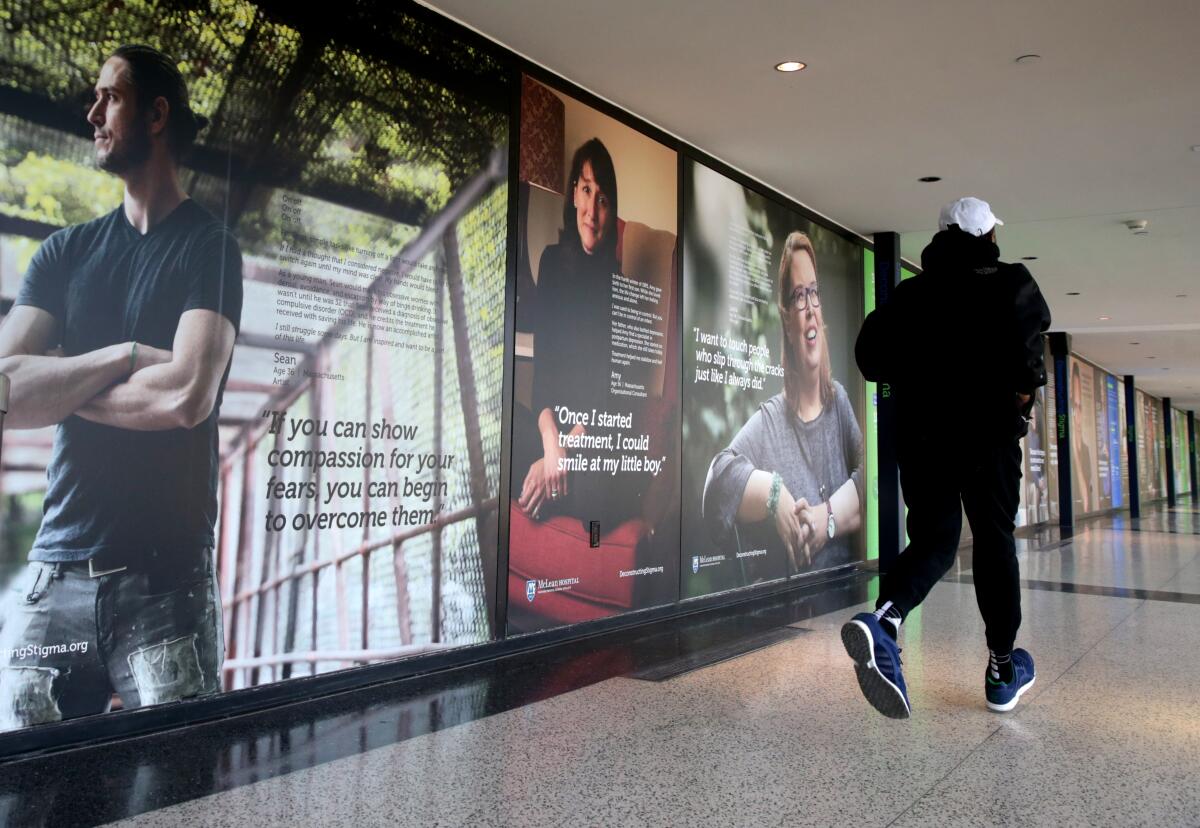I received six psychiatric diagnoses in 25 years. They were a dead end

- Share via
The day I sat in my psychiatrist’s windowless office and was told I had bipolar disorder, I’d already been in the mental health system for 25 years. It was my sixth diagnosis. Starting at age 12, I’d also been told I had anorexia, generalized anxiety disorder, major depressive disorder, obsessive-compulsive disorder and attention deficit disorder.
Sitting on my psychiatrist’s gray, puffy couch, I knew quite a bit about bipolar disorder — not just from my time in and out of doctors’ offices, partial hospitalization programs and intensive outpatient programs, but from the world around me.
Much of my education came from public awareness campaigns such as Mental Health Awareness Month, which just happened in May. The intentions are good: promote mental health, facilitate access to treatment and spread awareness to combat stigma.
An expert on the history of mental illness says the psychiatric profession must ‘stop pretending that chemistry is the sole and singular way forward.’
The problem is that awareness-based campaigns may not work as intended. Awareness can spark an increase in internet searches but doesn’t necessarily lead to action or change behaviors and is often ineffective at reducing stigma long term. Awareness days and months can reduce the problem to individual responsibility. Messaging that focuses on diagnoses and biological explanations has been found to produce pessimism in sufferers and potentially prevent people from seeking treatment.
Diagnoses didn’t always dominate conversations around mental health. Before 1980, psychiatric diagnoses as we know them today — accompanied by lists of symptoms — were mostly unknown to the public. The 1980s marked the widespread circulation of the third edition of the controversial Diagnostic and Statistical Manual of Mental Disorders, sometimes referred to as psychiatry’s “bible.” That edition became a yearly bestseller that reached a general readership beyond clinicians and mental healthcare professionals.
Today, largely thanks to the DSM, diagnoses are very much part of American culture. They’re memes. Therapists advise about them on TikTok. They’re romanticized on social media and elsewhere, with some earning the reputation of being cool and “trendy.” In a Vogue video, Kendall Jenner hears from a clinician in real time that she has social anxiety. News blogs encourage us to self-diagnose via symptom checklists. Anxiety and depression are merchandized. We self-diagnose and diagnose each other.
The toolkit for Mental Health Awareness Month in May, for example, offers screening tests, including ones for depression and anxiety that are trademarked by Pfizer — which has made billions from antidepressant and anti-anxiety medications. The tests state that they aren’t “diagnostic instruments,” but they suggest taking the results to a physician or healthcare provider. By that point, they’ve essentially declared whether you’re likely to have a diagnosis.
The shortcomings of advocacy campaigns plugging awareness, and pegging that awareness to diagnoses, aren’t specific to any single organization. Much of mental health advocacy has latched onto the most simplistic message: Feel bad? Having trouble? Get a diagnosis.
As a gay Latino, I encountered limited and lacking treatment options.
Why is this a problem? Because unbeknownst to many — and unbeknownst to me during the years I was being diagnosed — mental health diagnoses have questionable scientific validity. Biological markers — blood tests, X-rays or brain scans — can’t confirm DSM diagnoses. They generally rely on a patient’s self-reported symptoms and a clinician’s opinion. (The few exceptions include dementia and chromosomal disorders.) They vary by country and cultural context. Two clinicians assessing the same patient using DSM criteria often won’t even agree on a diagnosis.
Respected psychiatrists and researchers have raised concerns about the DSM for years. Leading up to the publication of the DSM-5 in 2013, Thomas Insel, then director of the National Institute of Mental Health, called DSM diagnoses “constructs” with “no reality.” That same year Steven Hyman, another former NIMH director, described the DSM model as “an absolute scientific nightmare.” In 2019, Allen Frances, former chair of the DSM-IV Task Force, said “diagnoses should be written in pencil.” This year he cautioned that the current DSM should include “black box warnings” for some entries.
Certainly, we should seek help, which often means getting a diagnosis to receive the right treatment. And of course diagnoses have been positive for some people, empowering them and providing relief, validation and connection. Diagnoses are also administratively necessary because they’re required for health insurance purposes and can give people access to services in part because they’re so central to our healthcare system.
But in my case, they were a dead end — from my first diagnosis to my sixth. I overidentified with them, seeing myself as them. It took extensive research and writing a memoir to learn about the inadequacy of those diagnoses. I still have a diagnosis and get treatment — my psychiatrist is open with me about the DSM’s flaws — but I don’t see myself through the lens of that diagnosis.
Before, I attributed all my distressing thoughts, painful emotions and undesirable behaviors to my diagnosis. I saw them as proof that something was wrong with my brain. Now, I see them as part of me and being human. Remarkably, this has lessened my symptoms.
Mental health awareness should include informing patients and their families about the potential fallibility of diagnoses so they can make knowledgeable decisions about their health. And the public should know, just as psychiatric professionals do, that diagnostic flaws don’t have to prevent people from getting the resources they need.
Sarah Fay is a mental health advocate and the author of “Pathological: The True Story of Six Misdiagnoses.”
More to Read
A cure for the common opinion
Get thought-provoking perspectives with our weekly newsletter.
You may occasionally receive promotional content from the Los Angeles Times.











